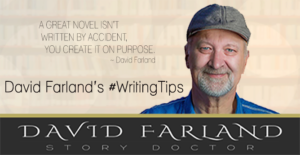Over the last month, you’ve celebrated the year through the eyes of the Fictorians and our guests. I think it’s safe to say that everyone had their share of ups and downs this year. We’ve reached the end of 2017 and tomorrow many of us will look at the coming year with a sense of purpose or a sense of uncertainty. There are 365 days ahead of us as writers. Some of them will be good and some will not – this is the writing life. What matters is that we face them together and do the very best we can.
By now, I’ve completed a list of what I think my goals should be for 2018, but I know that I may not reach all of them. If 2017 has taught me anything, riding the wave of opportunities means that my best laid plans will most certainly change. Remaining flexible is critical. Some times, you have to actually quit your goals. That’s what we’ll be talking about in January here on The Fictorians. Before we do that, though, I’d like to leave you with one more thought about your year in review and the year ahead.
One of the books that’s immeasurably changed how I approach writing is The Artist’s Way by Julia Cameron. One of the tenets of Cameron’s book is the concept of Daily Pages. Over the last few years, I’ve used a couple of different notebooks to do this. The idea is simple. Every day, sit down and write three pages. What do you write? Whatever is on your mind. I think of it as clearing the mechanism – I just write whatever is on my mind – a pure stream of consciousness technique. Often times, I may start off with a regimented idea of my to-do list or something similar. Some times I’ll start with a favorite memory from the day before. Sometimes, I’ll just vent my fears, my anger, or my remorse. By sitting down and forcing it out of my head, I’ve found that my writing time is more productive. I’m less likely to fall into my social media distractions. I’m more likely to hit my word count goal for the day when I take the time to write my pages. Three pages may be too much for you at first. I tend to do two pages on a pretty regular basis. Find what works for you. Clearing your mechanism is a good way to look past the stress in our lives. Journaling is a great way to get in touch with your ideas, too. Simply put, I recommend it. Whether you’re committing to a New Year’s Resolution or not, one thing writers do is read. If you haven’t read The Artist’s Way, do so sooner rather than later. Your writing will thank you.
Best of luck with your writing endeavors in 2018. We’ll be right here cheering for you.




